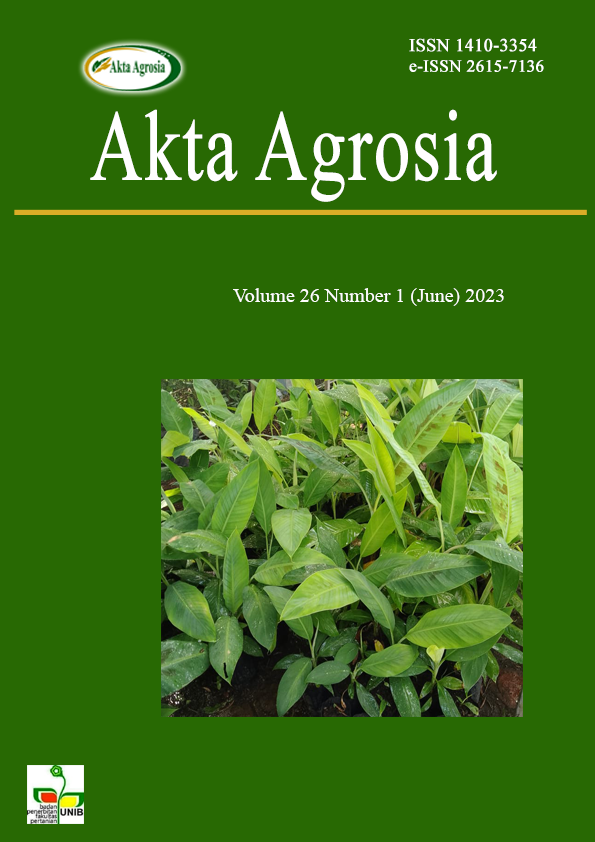Main Article Content
Abstract
Research on the adaptability of Jambi local rice and national rice varieties for cultivation under acid sulfate tidal swamp land with the application of ameliorants has been carried out in tidal swamp rice fields in Pembengis Village, Bram Hitam District, West Tanjung Jabung Regency, Jambi Province from April to September 2021. Ten local and national rice varieties were evaluated, including Kuatik Tinggi, Kuatik Rendah, Karya Tinggi, Karya Rendah, Karang Duku, Bujang Berinai, Pandan Wangi, Padi Belanda, Inpara, and Inpari. Whereas, Ameliorant treatments consisted 4 kinds, namely without ameliorant (control), dolomite lime, rice husk ash and areca-nut-fiber ash. The results of the experiment showed that there was an influence of local rice plant varieties on vegetative growth with the treatment of several rice plant varieties having a significant effect on rice plant height and significantly affecting panicle length, number of per panicle grain, and grain yield, but for the treatment parameters the maximum number of tillers and the number of productive tillers has no significant effect. Addition of ameliorants: dolomite lime, rice husk ash and areca nut fiber ash) showed reduction on rice plant height, maximum number of tillers, number of productive tillers, panicle length, number of grains per panicle, number of grains without panicles and grain yield.
Keywords: adaptation test, local rice, jambi, ameliorant, swampland
Article Details
Copyright (c) 2024 Abdul Hadison

This work is licensed under a Creative Commons Attribution-ShareAlike 4.0 International License.
Authors who publish with this journal agree to the following terms:
- Authors retain copyright and grant the journal right of first publication with the work simultaneously licensed under a Creative Commons Attribution License that allows others to share the work with an acknowledgement of the work's authorship and initial publication in this journal.
- Authors are able to enter into separate, additional contractual arrangements for the non-exclusive distribution of the journal's published version of the work (e.g., post it to an institutional repository or publish it in a book), with an acknowledgement of its initial publication in this journal.
- Authors are permitted and encouraged to post their work online (e.g. in institutional repositories or on their website) prior to and during the submission process, as it can lead to productive exchanges, as well as earlier and greater citation of published work (See The Effect of Open Access).
